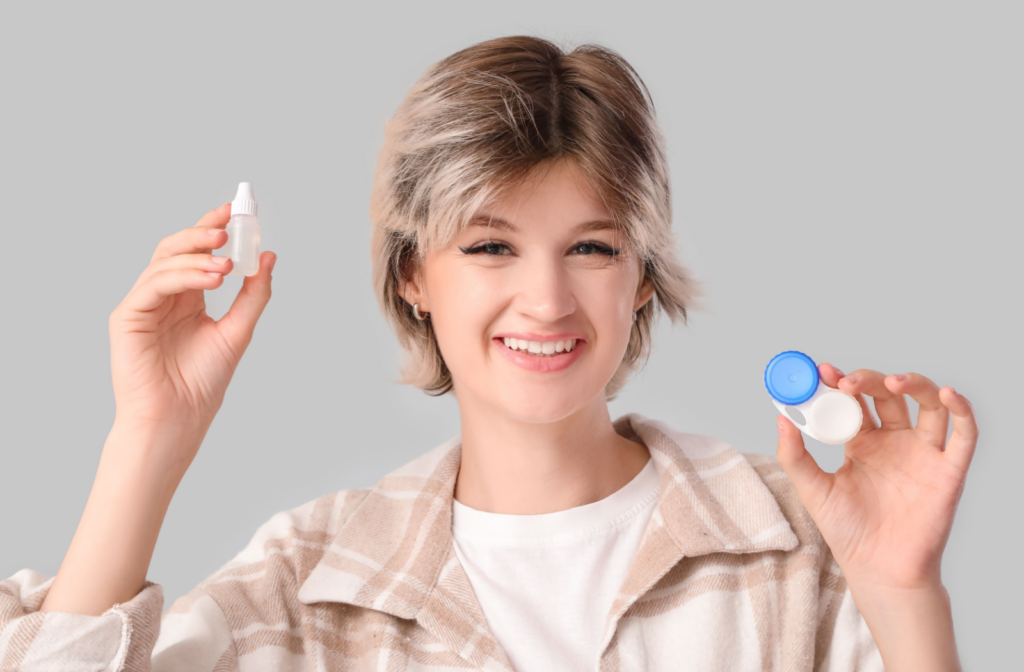Daily contact lenses can be a better option for people with dry eye, but it depends on your unique needs and the severity of your condition. While daily contacts are often more breathable and less likely to accumulate debris, they aren’t a universal solution. Understanding the specifics of your dry eye symptoms and how contact lenses interact with your eyes is key to making the right choice. You can find a contact lens option that works for you with the right guidance and care.
Can I Wear Contact Lenses with Dry Eye?
Wearing contact lenses might seem uncomfortable if you suffer from dry eye, but it doesn’t necessarily rule out contacts altogether. Many people with mild to moderate dry eye can wear contacts successfully with the right type and care.
Dry eye occurs when your eyes don’t produce enough moisture or the right type of tears, leading to irritation. Contact lenses can exacerbate this issue by absorbing moisture from your eyes, leading to even greater dryness. However, new materials, including silicone hydrogel lenses, allow for better oxygen flow and less dryness.
Seeing Clearly with Dry Eye
Managing dry eye while maintaining good vision can be tricky, but it’s possible with the right contact lenses or alternative solutions. For individuals who experience discomfort from traditional contacts, daily disposable lenses may help. These lenses offer fresh, clean surfaces daily, reducing the risk of irritation from buildup and allergens. Since they are replaced daily, there is also less chance of drying out or becoming uncomfortable.
Another option for those with dry eye is specialized contact lenses, such as those with a higher moisture content or those designed to lock in moisture and reduce evaporation. These lenses, known as “hydrating” or “moisture-seal” lenses, are made of materials that hold water more effectively, preventing dryness and irritation. They can be a good option for people with moderate dry eye who still want the convenience of contacts.
Scleral lenses may be a helpful option for people with more severe dry eyes. These lenses vault over the cornea, providing a cushion of fluid and preventing the lens from touching the eye directly. They are designed to maintain a stable tear film, offering comfort for those with chronic dry eyes. While scleral lenses require a more involved fitting process, they can be a game-changer for people whose dry eye symptoms are difficult to manage with standard contact lenses.
Finally, if contact lenses still aren’t working, it’s worth exploring other options, such as dry eye treatments focusing on restoring natural tear production. These may include using prescription eye drops or undergoing in-office treatments like LipiFlow to address meibomian gland dysfunction (MGD), which is often a contributing factor in dry eye.
Will Contact Lenses Damage My Eyes?
When worn correctly and under the guidance of a professional, contact lenses generally won’t damage your eyes. However, wearing contacts for extended periods, using the wrong type for your needs, or neglecting proper care can lead to complications like dryness, irritation, or infection.
If you’re experiencing discomfort, it’s important to consult with your eye care provider immediately to rule out any issues.
What Other Vision Solutions are Available for Dry Eye
If daily contacts aren’t the right fit for your dry eye symptoms, other effective vision solutions are available. Glasses are the most obvious alternative to contacts and can help alleviate discomfort by preventing the irritation caused by contact lenses. Additionally, glasses can provide a barrier against wind, dust, and other environmental factors exacerbating dry eye symptoms.
If you want to avoid wearing glasses but still need relief from dry eyes, you might consider other types of contact lenses. Hybrid lenses combine the comfort of soft lenses with the visual clarity of rigid gas-permeable lenses. They can be an ideal choice for people with irregular corneas or more severe dry eyes. These lenses offer a larger soft lens surface for comfort while providing the sharpness of a gas-permeable lens in the center.
For some individuals, managing dry eye involves treating the condition itself. Prescription eye drops, oral medications, and punctal plugs (devices inserted into the tear ducts to prevent tears from draining too quickly) can help alleviate symptoms. Additionally, lifestyle changes, such as increasing humidity in your home, reducing screen time, and taking regular breaks, can help reduce dryness.
If you’re looking for long-term relief, certain in-office treatments like LipiFlow and intense pulsed light therapy can help address the underlying causes of dry eye. These procedures aim to improve tear production and reduce inflammation, offering a more comprehensive solution to your symptoms.
Are Glasses Better than Contact Lenses for Dry Eye?
While contact lenses can provide convenience, glasses may offer a more comfortable solution for people with dry eye. Glasses eliminate the issue of lens-induced dryness, and they don’t require the same level of moisture and oxygen as contacts. For those with severe dry eye, glasses can offer a reliable, hassle-free alternative.
Moreover, glasses can protect your eyes from environmental irritants such as wind, dust, and allergens, which can aggravate dry eye symptoms. For people who experience dry eye because of exposure to these elements, glasses may serve as a barrier and provide some relief.
However, glasses aren’t the ideal solution for everyone. Some individuals may prefer the aesthetics or convenience of contact lenses and are willing to take extra care to manage their dry eye symptoms. The key is to weigh the benefits and drawbacks of each option and determine what works best for your lifestyle and comfort.
Find the Right Solution for Your Vision with Total Vision – Santa Cruz
At Total Vision, we understand that dry eye can be frustrating, especially when it comes to finding the right vision solution. Let us help you explore your options and find a solution tailored to your needs. Whether it’s daily contact lenses, specialized lenses, or another approach, we’re here to help you achieve clear, comfortable vision.
Schedule a consultation with us today to get started!



